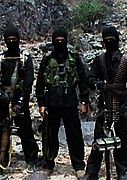IRGC and Ministry of Intelligence told Kidnappers to Kill the Guards
» Jeish al-Adl Spokesman Tells Rooz:
The kidnapping of five Iranian border guards by Jeish al-Adl, the execution of one of them the release of the remaining four because of the efforts of cleric Molavi AbdolHamid, the Sunni Friday prayer leader of the border town of Zahedan and other local clerics made me pursue an interview with Abdol Raoof Righi, the spokesman of the group. He said that the group released the remaining guards without its demands because of the stature that AbdolHamid and other Sunni clerics enjoyed among the locals.
The body of the executed guard is not being returned by the Jeish whose leaders have asked that the body of their prisoners in Iran be returned to them as a condition. Here are the excerpts of the interview.
Rooz: Tell me about the release of the guards. Local authorities told me they did not give you anything in exchange for the release.
Righi: That is right. We were not given what we were promised. Sunni leaders intervened and sent a group to talk with us about the guards on behalf of the most prominent Sunni cleric, Molana AbdolHamid. I met with the group whose members requested that we release the guards. In return, we asked that they at the least work towards the release of our prisoners in Baluchistan, which includes Sunni clerics. They said they would but added that we make an exception this time and release the guards. This was discussed at our council and we decided to release the guards because we do not want people to say that we are against Sunni clerics, even though we do have differences with them. They believe in the non-violent approach to attain their rights while we believe in armed struggle. We released the guards with the expectation that they would reciprocate. But they did not and so in future we will not accept such mediation efforts.
Rooz: You released the guards because of the esteem that the Sunni clerics enjoy among the public. So you do not enjoy such base among people?
Righi: Sunni clerics enjoy a leadership position among people. We are part of people too. We do not want to compete with the clerics. Our enemy with whom we are in confrontation is the regime which is oppressive and denies us our rights.
Rooz: You say you respect the Sunni cleric leaders tut you killed sergeant Danaifar after the representatives of the clerics had met and spoken with you.
Righi: That is not true. Danaifar was not a sergeant (an NCO); he was an officer as his father said in an interview with a newspaper. He worked for the regime and received a salary from it. He was not a conscript. In any case when the guards were kidnapped, we wanted to solve the issue peacefully so that some of our prisoners would be released as well. At about this time one of our friends who was not a member of our group was tortured to death by the Iranian regime. When his family members saw his body they noticed the torture marks and informed us of this. So when the Iranian regime treated one of our friends, not even a member, in that manner, it was decided that Danaifar should be executed. When we met with the visiting group of clerics we told them that the decision to execute had been taken before they had come, but that I would still try to convince the others not to proceed with the execution. But the decision had already been made.
Rooz: Your act is a violation of all international norms and agreements. They do not do this even at time of war.
Righi: We are a guerilla group and have not signed any international agreement and therefore are not obliged to follow them. Under the Geneva agreements it is states that have responsibilities regarding human rights.
Rooz: What do you see yourself committed to?
Righi: We are in a state of war with the Iranian regime. This is not an act of kidnapping. We had more than a hundred operations last year. In this war sometimes our men become prisoners and sometimes theirs. All of our men who were caught were executed. If we wanted to act like the regime has acted then we should have executed all of the prisoners. We treated the prisoners according to human and Islamic principles and wanted to solve this issue peacefully.
Rooz: So what happened to the Islamic principles regarding Danaifar?
Righi: According to our laws a prisoner is either a regular soldier or a military cadre; the latter is a criminal who may be executed.
Rooz: Does Islam and the Quran give you the authority to execute a prisoner?
Righi: Our law stems from the Quran and the tradition of the Prophet. Islam reserves execution for criminal prisoners.
Rooz: What crime had Danaifar committed?
Righi: A military cadre is a criminal and can be executed.
Rooz: Has Danaifar’s body been buried?
Righi: Not yet, we are waiting to see what the regime does.
Rooz: What are your demands?
Righi: We want the Sunnis to gain their legitimate human, social and political rights. We want our rights. It is not possible to attain these rights peacefully. In Baluchistan nobody has the right to defend his rights. We are after a federal system where we can have self-determination.
Rooz: Were you financially supported by Saudi Arabia?
Righi: We used to be but now we have taken control of some towns in Baluchistan. The ministry of Intelligence and the Revolutionary Guards wanted us to kill the guards.


